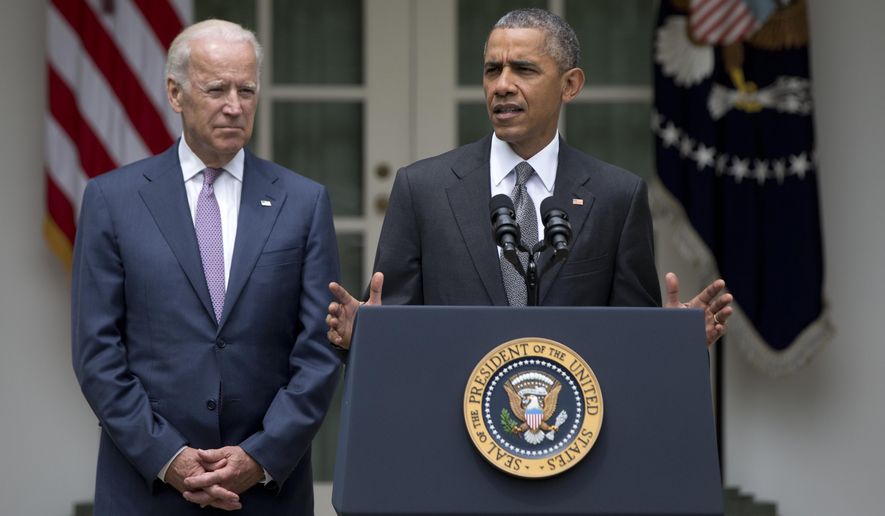The Supreme Court upheld Obamacare’s ability to pay subsidies to customers throughout the U.S. in a ruling Thursday that cements the law’s legal standing, delivering a resounding win to President Obama, who said it was time for Republicans to accept defeat and move on.
Chief Justice John G. Roberts Jr. wrote the majority opinion in the 6-3 ruling, saying that judges sometimes need to look beyond the letter of the law to determine their meaning. In this case, he said, that meant Congress intended for subsidies to be paid nationwide.
“Congress passed the Affordable Care Act to improve health insurance markets, not to destroy them. If at all possible, we must interpret the act in a way that is consistent with the former, and avoids the latter,” he wrote in an opinion joined by Justice Anthony M. Kennedy and the court’s four liberal-leaning justices.
The immediate effect is that more than 6 million Americans, living in 34 states that haven’t set up their own exchanges but instead rely on the federal HealthCare.gov portal, will continue receiving subsidies, making insurance more affordable and preserving the economics underpinning the law.
The ruling was a complete victory for Mr. Obama, who said it puts a capstone on his legacy and should be the end of Republican efforts to overturn the 2010 law, known officially as the Patient Protection and Affordable Care Act.
“After multiple challenges to the law before the Supreme Court, the Affordable Care Act is here to stay,” the president said in a Rose Garden address shortly after the decision. “This morning the court upheld a critical part of this law, the part that made it easier for Americans to afford health insurance regardless of where you live.”
SEE ALSO: Chief Justice Roberts saves Obamacare for 2nd time; Scalia chides: ‘Words have no meaning’
Combined with a 2012 ruling, also authored by Chief Justice Roberts, Thursday’s decision settles the biggest legal questions surrounding the health care law and heads off the flashpoint that congressional Republicans hoped to use to force Mr. Obama to accept changes. If the justices ruled against the subsidies, millions of Americans would be left without the ability to pay for Obamacare coverage, which Republican leaders said would be their chance to negotiate changes.
Instead, the battle shifts to the presidential election, which Republican hopefuls said now becomes yet another referendum on the law.
In a searing dissent, Justice Antonin Scalia mocked the chief justice’s logic, saying it sets a dangerous precedent for the high court where “words have no meaning” and the justices can reinterpret the text of any law.
He questioned the motives of the majority and wondered whether the law should be renamed “SCOTUScare” — using the acronym for “Supreme Court of the United States.”
“Under all the usual rules of interpretation, in short, the government should lose this case,” said Justice Scalia, joined by Justices Clarence Thomas and Samuel A. Alito Jr. “Normal rules of interpretation seem always to yield to the overriding principle of the present court: The Affordable Care Act must be saved.”
As written, the Affordable Care Act says subsidies are to be paid to residents in exchanges “established by the state” and envisions each state setting up an exchange to be run in a way that benefits its own residents.
But the 2010 law also allowed the Health and Human Services Department to stand in for states that refused to set up their own exchanges.
The IRS interpreted the law to mean that residents anywhere could be paid subsidies, arguing that Congress wouldn’t have meant to divide the country into two camps.
The chief justice accepted that argument.
“Those credits are necessary for the federal exchanges to function like their state exchange counterparts, and to avoid the type of calamitous result that Congress plainly meant to avoid,” he wrote.
The ruling upheld a decision by the 4th U.S. Circuit Court of Appeals, which sided with the administration after four Virginia residents sued because they didn’t want to be forced to buy health insurance. Subsidies on the federal exchange made exchange plans affordable under the law, they said, triggering the mandate to hold coverage.
Health care advocates and insurers tracked the case closely, as the loss of subsidies likely would have forced healthier consumers to drop coverage first, causing a ripple effect in insurance markets. Some insurers had filed their rates for the 2016 plan year and threatened to withdraw their proposals had the ruling gone the other way.
The case also reverberated on Capitol Hill, where Republicans hoped for months that a ruling against subsidies would create an incentive for Mr. Obama and congressional Democrats to negotiate.
Without that opening, Republican lawmakers were left to debate whether it made sense to try to attack the law yet again, knowing that Mr. Obama wields a veto. Some Republicans are still eyeing a fast-track budget tool known as “reconciliation” that makes passage in Congress easier — though it wouldn’t overcome the veto.
House Speaker John A. Boehner, Ohio Republican, said the Affordable Care Act is “broken” and should be eliminated, but he refused to say Thursday whether his party would use reconciliation for repeal.
“There’s been no decision about what to use reconciliation for,” he said.
House Minority Leader Nancy Pelosi, the California Democrat who helped muscle the law through Congress with no Republican support in 2010, said it’s time for Republicans to give up.
“Two times now,” she said, “the Supreme Court has spoken and upheld the Affordable Care Act.”
⦁ Ben Wolfgang contributed to this report.
• Tom Howell Jr. can be reached at thowell@washingtontimes.com.




Please read our comment policy before commenting.